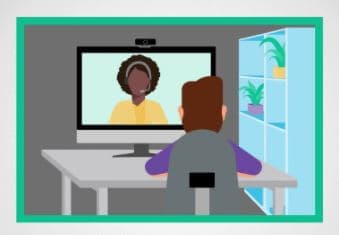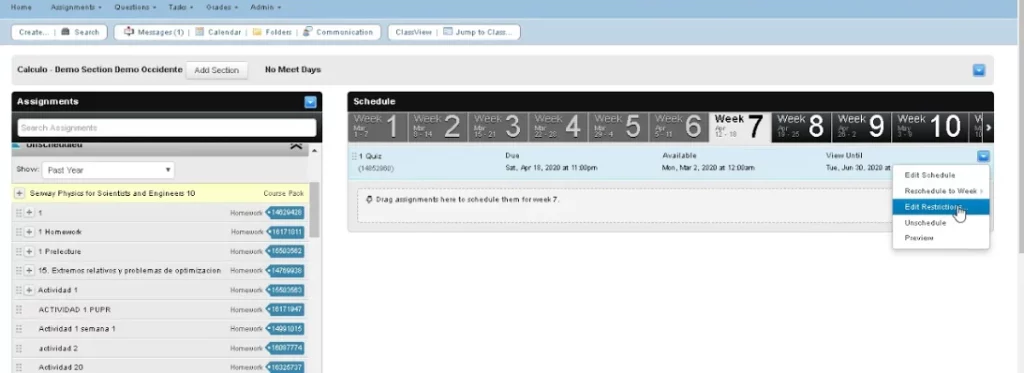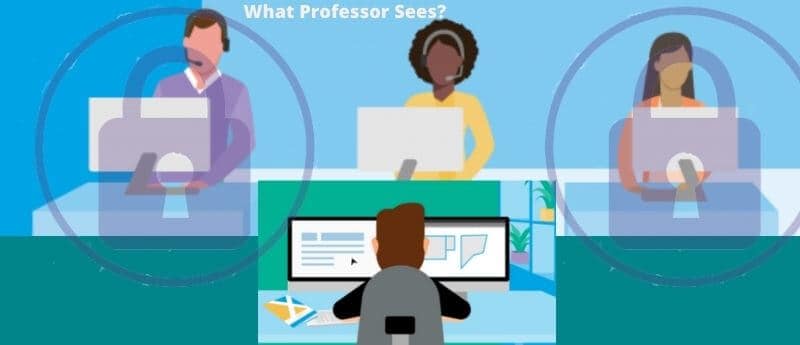Most educational institutions adopt proctoring as a way of preventing and detecting cheating. One of the proctoring methods is using lockdown browsers, which they task the professors to monitor during tests and exams.
However, the question arises if professors do really adhere to the guidelines and actually watch the proctoring browsers. We are all humans, and sometimes, people tend to assume. That is the same with professors.
Professors do watch lockdown browsers to help curb cheating in an examination. They watch and monitor as every student takes the tests. It is just like supervision in exam rooms in colleges. The difference is that one is face to face and the other one is virtual.
Professors also access audios of every student’s background. By watching the test being done on the lockdown browser professors can call out any malpractice and answer any queries the student may have concerning the exam.
However, some professors do not watch the lockdown browser. They believe that the restriction activities put in place by the lockdown browser are effective. They simply assume that it students will not cheat.
All they do is set the time for the test and mark them when they are completed. They also believe that it is a tiresome activity watching as tens or hundreds of students do their quizzes.

Can Professors see you on the Lockdown Browser?
The professors can see you on the lockdown browser using the lockdown monitor. The monitor uses the webcams on PCs and laptops to record the students as they do the examinations. Some professors are interested in checking the environment or surroundings that students are doing the exam in.

They also do so to make sure that no one is getting involved in any activity that they shouldn’t be involved in during the exam.
They know that the lockdown browser does not entirely detect cheating, but they are dedicated to making it harder for any student to cheat.
Some people, mostly students, assume that professors don’t see them and cheat in exams, which is risky.
There is always an emphasis on doing the exam using a computer that has a microphone and a webcam. Without the webcam, one is not allowed to do the exam.
Instances when Professors watch Lockdown Browsers
Professors watch lockdown browsers if they want to monitor how the exam is being done. Some professors are strictly against cheating and will dedicate their time to watching lockdown browsers to ensure that there is minimal teaching.
Some professors watch lockdown browsers if the institution requires them to do so. Most institutions strive to reduce instances of cheating in exams.
They task the professors with watching lockdown browsers throughout the exams to at least instill fear in students who may be looking forward to cheating in the exam.
Professors watch lockdown browsers to review any instance that is flagged by the lockdown browser. The browser flags instances that look fishy.
It is always important for professors to check them out to determine whether they involve behavior allowed during an exam or not. This is how lockdown browsers work to detect cheating and prevent any fishy behavior during exams.

The lockdown browser will flag things like other people appearing on the frame, suspicious movements, and if your face is no longer available.
Professors check these instances to determine whether something is off.
Many professors have revealed that most of the instances that are flagged by the lockdown browser are nothing that can make the student culpable for cheating in an exam.
Professors will check a flagged instance where a student is not looking at the exam screen, but that is not enough to establish whether one was cheating or not. Normally, some questions take your concentration away from the computer.
The professor reviews the work of students by clicking on the class results on the Respondus browser. A roster of all students then appears. In the roster, there is the student’s name and the review priority, which reveals whether the test requires a closer look by the professor.
Other information in the students’ roster includes the date the test was taken, the score and the duration of the tests. Information on the percentage of facial detection, flags, and total flagged time is also available.
The review priority information that will influence whether the professors should watch the lockdown browser recording of a student during the test includes the student’s interaction with the test; this includes when the student starts the exam when the student saves answers, and the time that the student exited the test.
Webcam video of the test taker; this helps determine all flagged events. The computing device and network used for the test helps provide information like auto restarts of the webcam, video interruptions, attempts to switch applications, and mouse, keyboard, and trackpad use.
Instances when Professors do not watch Lockdown Browsers
Professors do not watch lockdown browsers if there are no flags of anything suspicious. If the lockdown browser does not notice any malpractice and flags it, the professor may assume that everything is fine and will not bother to watch the lockdown browser’s recordings.
The professor may also not be interested in watching the lock-down browser. In instances where there are a lot of students involved, the professor may find it hard to watch the students on the Lockdown browsers.
When the flags are too many, the lecturer can ignore them or have a look at a few and leave the rest. They are the people who man it. While some people may ask whether lockdown browsers are legal, it is the use by the professor that makes it effective.
The professors may not watch the lockdown browser if they believe that the browser is effective in preventing cheating on its own. The professors may have conducted several tests in the past which have had no cheating instances.
They, therefore, believe that students are deterred from cheating by the fact that they cannot access other web pages during the exam and that they are being recorded by the webcam during the exam.
Some professors trust their students not to cheat and therefore find no need of watching the lockdown browser. If the professor has dealt with the students for several years and has never noticed any instance of cheating, then he or she has faith and believes that the student will not cheat in the examination.
How to safely use the Lockdown Browser to avoid Cheating
Lockdown browsers can be used to set up tests and avoid cheating. For example, when using Blackboard, tests can be set up to require the use of lockdown browsers very easily. The following steps can be used:

- First, make sure that the test is in the Blackboard course.
- In the course tools on Blackboard which are located on the control panel, select the link Respondus lockdown browser.
- A list will be displayed of deployed tests. The tests that are labeled “required” will require the lockdown browser, while those labeled “not required” will not need the lockdown browser.
- Settings of the tests can be changed on the context menu by selecting settings. It is important to note that changing the settings once the lockdown browser is enabled will interfere with the settings of the lockdown browser.
- You can then set a password that students will be required to enter to start the test. Students will be prompted to enter this password before starting the test.
- You can now set that the students use a webcam in the test by selecting “require Respondus monitor” in this exam.
- Avoid using phones while you are in the exam session. As we noted in another guide, lockdown browsers do not detect phones but use the webcam to tell if you do fishy activities.
Is the lockdown browser effective in proctoring exams?
Lockdown browse is very effective in proctoring exams. As discussed in the guide to cheating in schools, we highlighted that the lockdown browser is effective. However, it is not the ultimate solution if applied alone. The following are some of the benefits that one can accrue from the Respondus lockdown browser:
- It prevents students from taking screenshots of the exam.
- It prevents students from copying and pasting the contents of a test.
- The student cannot access instant emails or texts during an examination.
- The student cannot print the examination.
- The lockdown browser prevents students from accessing other applications during the exam.
- The students also cannot access other websites during the examination.
- All links to external content are disabled.
- All function keys are disabled.
- The toolbar option and the browser menu are disabled. Only Back, Forward, Refresh, and Stop are allowed on the toolbar.

With the advancement in technology, the Respondus lockdown browser has a new option. This is the Instructor Live Proctoring, which has been enhanced by the use of a web-based video conferencing system.
This includes Zoom and Google Meet. This has made it possible for students to be proctored in real time while taking online quizzes and exams.
The lockdown browser can also be used to take tests in an already proctored environment. These included classes and testing centers.
Recent data or research or instances involving lockdown browsers
Lockdown browser is one of the major leading third-party tools in the education system around the world. Over 2000 institutions use the lockdown browser together with their learning management systems.
Through its annual licensing, institutions can make the use of the lockdown browser unlimited throughout the year.
Using the Respondus technology, over 100 million assessments are created, delivered, analyzed, and proctored.
This technology has existed for over twenty years. Since its start, it has partnered with universities and education companies to produce world-class education technologies.

